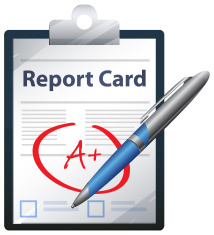It’s the most common way to get the inside skinny on a college program. Find an alum and have a candid conversation with him or her. That word-of-mouth endorsement or complaint will have far greater impact on an applicant’s decision than the slick marketing brochures and websites that inundate candidates and their parents.
So when we decided to rank undergraduate business schools, it made perfect sense to search out alumni and ask them the questions that applicants might typically ask. Sure enough, most business school deans agreed and suggested we survey alumni who were out of school by two years. That would be enough time to effectively gauge how helpful their undergraduate education was in preparing them for the world of work and provide enough distance from school to get the most candid replies. That’s exactly what we did.
The survey revealed that, at least among these leading business schools, satisfaction is extraordinarily high. While some schools obviously did better than others, in most cases the differences weren’t all that great. The gap between the highest scorer and the lowest scorer on any one of our dozen core satisfaction questions was not extraordinarily high. On a 10-point scale, with 10 reflecting the most positive response possible, the difference could be roughly three points from top to bottom. That is a significant difference, but it still reflects a level of high satisfaction with schools. In one case, alumni could be described as enthusiastically positive. In another, merely positive. In no way were any of the scores truly damning. If we surveyed alumni from a larger population of schools, as we intend to do next year, the top-to-bottom differences would likely be greater.
HOW WE GRADED THE UNDERGRADUATE EXPERIENCES AT THE BEST SCHOOLS
 For example, on the question, “How willing and accesible were the school’s alumni in helping you connect with potential employers?,” the top scoring school, Washington University’s Olin School of Business, was given a 9.58 by its alumni, while the lowest scoring school, Purdue University’s Krannert School of Management, was awarded a 7.12. On another question, “How would you appraise the business program’s efforts to bring you into contact with practicing professionals, including your school’s alumni network, in the business community?,” Indiana University’s Kelley School of Business killed it, scoring a 9.42 from its alumni. Carnegie Mellon University’s Tepper School of Business was at the bottom, with a 7.31.
For example, on the question, “How willing and accesible were the school’s alumni in helping you connect with potential employers?,” the top scoring school, Washington University’s Olin School of Business, was given a 9.58 by its alumni, while the lowest scoring school, Purdue University’s Krannert School of Management, was awarded a 7.12. On another question, “How would you appraise the business program’s efforts to bring you into contact with practicing professionals, including your school’s alumni network, in the business community?,” Indiana University’s Kelley School of Business killed it, scoring a 9.42 from its alumni. Carnegie Mellon University’s Tepper School of Business was at the bottom, with a 7.31.
Schools were assigned an A grade on a question received above average scores from their alumni. Those who were given B grades were below the average. Like any academically demanding professor, we graded on a curve. But the curve was generous. No school was awarded a C on any question. No school flunked the test. The top five in any category were given A+. After all, there are now roughly 693 undergraduate business programs accredited by the AACSB, the major accreditation agency for business schools. The schools whose alumni participated in our ranking are among the top seven percentile of programs in the world, the very best of the bunch. So their presence on the list, no matter where they fall, is the ultimate accolade.
One obvious drawback to alumni surveys is that graduates typically know their answers are a reflection of their school’s reputation and brand. As a result, alums could be biased in favor of their program when they complete these surveys. On the other hand, only a few disappointed graduates can quickly offset quite a few cheerleaders. Overall, therefore, you tend to get more candid replies than you might expect, especially in a new survey where graduates might be less conscious of the ranking’s impact.
Though we sent surveys to alumni at 37 schools that participated in this part of our ranking project, only 28 met the minimum 10% participation. Among those schools, 13,605 alumni received our survey and 1,871 completed it for a response rate of 13.8%. The College of New Jersey had the highest response rate, 51.8%, while Minnesota’s Carlson School of Management had the lowest acceptable rate at 10.3%.
WHAT WE ASKED CLASS OF 2014 ALUMNI ABOUT THEIR BUSINESS SCHOOLS
Here’s the complete list of questions we asked business school alumni, with links to the results and our commentary:
1. Would you recommend the business program to a close friend?
2. Evaluate how well the business program prepared you for the world of work.
4. Do you believe the business degree was worth its time in cost and tuition?
6. How would you rate the quality of teaching in business courses?
8. How would you appraise the effectiveness of the business program’s academic advising effort?
10. How would you appraise the effectiveness of the business program’s career advising effort?











